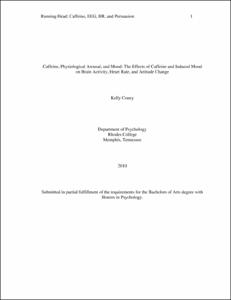Please use this identifier to cite or link to this item:
http://hdl.handle.net/10267/7402Full metadata record
| DC Field | Value | Language |
|---|---|---|
| dc.contributor.author | Coney, Kelly | - |
| dc.date.accessioned | 2010-06-02T18:20:51Z | - |
| dc.date.available | 2010-06-02T18:20:51Z | - |
| dc.date.issued | 2010-05 | - |
| dc.identifier.uri | http://hdl.handle.net/10267/7402 | - |
| dc.description | Kelly Ann Coney granted permission for the digitization of her paper. It was submitted by CD. | en_US |
| dc.description.abstract | There is evidence that caffeine makes people more susceptible to attitude change, but what drives this effect is unclear. We studied the effects of caffeine and mood on attitude change, heart rate (HR), and brain activity (measured with electroencephalography— EEG). Participants received caffeine or a placebo and viewed positive, neutral, or negative pictures from the International Affective Picture System (IAPS), which are standardized for valence and arousal. Participants then read persuasive arguments for implementing senior comprehensive exams at a nearby institution. Attitudes about such exams were taken before the study and after the participant read the persuasive argument. EEG and HR were recorded before and after caffeine consumption and picture viewing. Unexpectedly, HR decreased in the caffeine condition and increased in the placebo condition, suggesting that withdrawal affects HR more than caffeine itself in caffeine users. Although the caffeine manipulation failed to produce an attitude change in this study, our HR findings suggest that previously reported caffeine-facilitated attitude change may actually have been due to relief from withdrawal effects that were present in the placebo condition. Also in the present study, negative IAPS images decreased selfreported mood, but there were no other effects on mood or arousal. In general, cognitionrelated brain activity increased (high alpha activity decreased and beta activity increased) after the persuasive argument, especially toward the back of the head. However, the caffeine and mood manipulations produced more complex interactions. | en_US |
| dc.description.sponsorship | This honors paper was approved by Dr. Jeffery J. Sable, dr. Bette Ackerman, Dr. William Cunningham, and Dr. Natalie Person. | en_US |
| dc.publisher | Memphis, Tenn. : Rhodes College | en_US |
| dc.rights | Rhodes College owns the rights to the archival digital objects in this collection. Objects are made available for educational use only and may not be used for any non-educational or commercial purpose. Approved educational uses include private research and scholarship, teaching, and student projects. For additional information please contact archives@rhodes.edu. Fees may apply. | - |
| dc.subject | Text | - |
| dc.subject | Psychology, Department of | en_US |
| dc.subject | Honors papers | en_US |
| dc.subject | Student research | en_US |
| dc.title | Caffeine Physiolology Arousal, and Mood: The Effects Of Caffeine and Induced Mood on Brain Activity, Heart Rate, and Attitude Change | en_US |
| dc.type | Thesis | en_US |
| Appears in Collections: | Honors Papers | |
Files in This Item:
| File | Description | Size | Format | |
|---|---|---|---|---|
| ConeyHonors_2010.pdf | 918.46 kB | Adobe PDF |  View/Open |
Items in DSpace are protected by copyright, with all rights reserved, unless otherwise indicated.